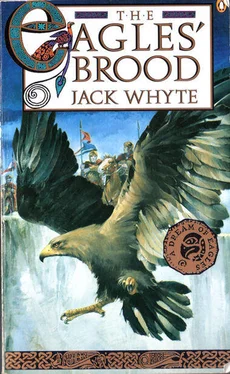"Well?" he asked me. I shook my head, for I had no words to say. My eyes could not comprehend the purity of that blade. It was almost colourless, and yet it was polished silver, smooth and unmarked and flawless. The light from the fire blazed from it in a way I had never seen. Not even the finest mirror of polished metal could reflect colour with such astonishing perfection.
"Take it," my uncle said. "It won't bite you, although it could. Be careful of the edge. It's sharper than anything you've ever felt before. Go on, take it." I reached out and closed my hand around the hilt, feeling the texture of it against my palm as I drew the Sword towards me. My uncle's face was split by an enormous smile, which I knew later to be the satisfied, ecstatic smile of the sublime artist and creator. "You like it?"
Again I could only shake my head. Gradually, I began to test it. It took the strength of both my arms to lift the point free of the floor, seated as I was, but then I reached the balance point and I felt its weight settle back into my grasp like a living thing.
"It's alive!" I whispered. "What have you named it, Uncle?"
"It's called Excalibur."
"Excalibur?" I repeated it, still whispering. "Excalibur! It is a beautiful name. And it is a beautiful sword."
He laughed. "Aye, look at the hilt. You see that grey- black stuff covering the grip? That is the belly skin of a mighty fish. A shark. I had it sent to me years before you were born. A fisherman in Africa used to use it to wrap the handles of his knives. That skin will never slip in a man's grasp, no matter how he sweats. It's constantly firm and hard and never slippery. I bound it into place, as you can see, with wires of gold and silver intertwined into a net. It took me five months just to bind that hilt the way I wanted to."
"And this?" I asked. "This cross-piece? How was it made? Is it silver? It's different from the blade. How did you do it?"
"It's one piece, lad. A secret I learned from my own grandfather. Give it to me, let me show you." I handed the Sword back to him, and he held it up in front of him, admiring the lines of it as he continued speaking. "You know the making of a blade, any blade. What's the main difficulty?"
That was easy. "Binding the hilt to the tang."
"And why is that?"
"Because they're two different pieces. If the blade is short and broad, you can rivet the sides of the handle together through the tang. That's the best way. But the bigger the sword, the harder it becomes to fasten the hilt securely. You can rivet it, and then bind it with wire, or you can drill a hole lengthwise through the hilt piece, insert the tang, and then bind the whole thing together with a weighted pommel at the end against the heel of the hand, flattening the end of the tang against that, like a rivet."
He smiled at me again, pleased with my knowledge. "Good! But there is another way, Caius, and that's what you are seeing here. Can you guess how this was done?"
I looked closely at the Sword again, trying this time to ignore its beauty and see only its construction. It had a wide cross-hilt stretching almost the entire span of my twelve- year-old hand on either side of the hilt itself, and the arms of this cross were intricately worked in flowing designs of thorn branches and leaves. The hilt itself was slightly more than double the length of a normal short-sword's hilt and was wrapped in the manner described, sharkskin held in place by a net of golden and silver wires. The pommel, the endmost piece of the Sword, was a full cockleshell, perfect in shape and detail, the tracery of the scalloped shell perfectly symmetrical. There was no sign of the tang ever having protruded through the pommel. The entire construction, cross-piece and all, was, as my uncle had said, of one solid piece. I stared at it, racking my brain for an explanation and then shook my head.
"No, Uncle," I said eventually. "I can see that it's one piece, as you said, but I can't see how you were able to do it. How did you do it?"
His smile was still one of great pride. "My grandfather left me a parchment outlining a method used by a friend of his who had discovered it in North Africa. It is a little- known way of pouring whole metal figures that was once widely used by the Parthians and the Medes—"
I interrupted him. "You mean for making statues?"
"Yes, something like that."
"They use that method in Rome today, don't they?"
"Almost. As I say, something like it. In that method, the Roman one, the metal is melted in a crucible and then poured into a series of moulds to cool, and when the pieces are assembled, you are left with a hollow metal replica of what you set out to duplicate."
He had caught my interest. "How do you make the mould in the first place?" I asked him.
He stood up and crossed to one of the many tables in the room to pick up a small box-like object I had seen so many times that I had lost awareness of it. He threw it to me and I caught it like a ball, almost dropping it because of its unexpected weight.
"That's a mould. If you look closely, you'll see how to open it." It opened into two halves and protruding from one of the two pieces was a brass hemisphere that looked familiar. I shook it free and a brass apple fell into my hand. "Do you remember that?" I did. I had played with it as a young child. I nodded. "Now look inside the mould. Each half is a perfect replica of the outside of half the apple, even to the stem."
He took it from me and placed the two pieces together, pointing out a blocked hole in the top and a number of smaller holes all around the shape. "If I were to pour molten lead, silver or gold into this, and leave it to cool, I would open it to find a metal apple. A little cleaning and polishing and it would be as perfect as that one you're holding."
"And that's how you made the Sword?"
"No, of course not! Only the hilt."
"I'm sorry, that's what I meant."
"I know it was, but you must learn to say precisely what you mean."
"Yes, Uncle. But, if that's all there is to this secret, why haven't we been using it all the time?"
"I didn't say that's all. there is to it. I said it was almost the same thing as the method generally used. The method I have learned is a different one. It uses different techniques. Most people today pour into clay moulds, and it is almost impossible to keep air bubbles out of the molten metal. That's why most of the moulded forms we have are hollow. That one, the apple you are holding, is solid, and so is the hilt of the sword. I had Father Andros carve me a hilt in wood. I made a clay mould of it and then I moulded the shape itself in wax, so that I ended up with a perfect wax replica of the wooden hilt, d'you follow me?" I nodded my understanding. "Good. Well, then I packed the wax in sand, tightly, and poured molten bronze into the mould. The bronze melted the wax and replaced it, perfectly, although not the first time I attempted it. When I was convinced I had the method perfected, I repeated it, this time with the tang of the sword inserted into the wax in the mould. It did work, eventually, but it took me five months and ten attempts to get it right. That hilt is absolutely solid; metal bonded to metal."
"Bronze? But it's silver."
"No, Caius. It is beaten silver over bronze."
I held out my hand and he returned the Sword to me. I held the hilt up to my face and looked at it again, closely and carefully. There was no sign of any seam or joint. "How did you say this is named, Uncle?"
"What? The technique? It has no name that I know of, but my grandfather wrote that the people of Africa and Asia Minor who deal in such things apparently call their moulds 'qalibr.'"
The word sounded strange and exotic in my ears and the small hairs on my arms stirred. "Qalibr," I said. "The hilt came out of a mould. Ex-qalibr. That's where you got the name!" I tested it with my tongue, knowing by the goose- flesh on my arms and neck that it was the perfect name. "Ex-qalibr!"
Читать дальше









